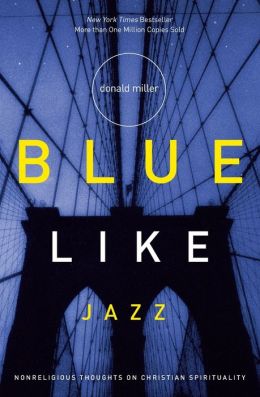I didn't want to like Donald Miller's Blue Like Jazz (2003). As a conservative, evangelical Christian, I had implicitly and explicitly heard over the last 10 years that this was a dangerous book and that it was probably best if I just avoided it. A few months ago, I finally gave in and picked up a copy at a thrift store in town. I left it on my shelf for a while, but last week, I decided to wade in.
Blue Like Jazz is a memoir of sorts, Miller's wrestlings with the fundamentalist tradition in which he was raised and the Christian Spirituality to which he was drawn. His focus was primarily upon the years of early adulthood, which are formative for all of us. With paper and ink, he poignantly described his journey.
There were many things I liked about this book. Miller appears to write with transparency, authenticity, and honesty. He puts into print questions that many Christians ask of themselves and others. And then he wades through them.
His commitment to the Gospel message and to following Jesus come through on nearly every page, yet he willingly admits his stumbling on the journey. For example, on page 111, he wrote "Tony asked me one time if there was anything I would die for. I had to think about it for a long time, even after thinking about it for a couple of days, I had a short list. In the end there weren't very many principles I would die for. I would die for the gospel because I think it is the only revolutionary idea known to man." However, he also admits that it is difficult for him to evangelize. He is a man of apparent contrasts.
He also wrote a lot about spending time with sinners. Sinners! As a student at Reed College in Portland, apparently one of the most liberal colleges in the the United States, and afterwords living in the woods, he had friends who were pot-smoking, promiscuous hippies. And yet, he still hung around with them. What would Jesus say about someone who hung around with non-religious sinners?
I also appreciated his stance on the importance of community. He admits that he can be somewhat of a recluse, describing himself as a battery for a power tool that needs 20 hours to recharge for 10 minutes of use. And yet, he was intentional about community. (If I recall, he has more recently gone on record saying he doesn't really need church and I would like to ask him how this new stance fits with his previous thoughts).
I can also see where people have had concerns. For one thing, it appears that he is comfortable with faith being based upon feeling and downplaying the importance of cognition/logic. I am someone who believes that Christian theism is intellectually defensible, yet I agree with him that rarely will an intellectual defense get someone to the cross. Ravi Zacharias, a speaker Miller really appears to like, has described an intellectual defense of the faith as "brush clearing", getting arguments out of the way so that people can see the cross. For me personally, I do think feeling is important, but so is cognition and volition.
There also seemed to be glimpses of intellectual superiority. Miller would write about Republicans or fundamentalists with some veiled derision. I found myself wondering if he was aware of this tendency in himself. I suspect he is, and if I were to point it out to him, I suspect he would look at me and say, "Jason, you are right on."
In sum, I liked this book. As Tim Challies wrote on his review 9 years ago, "Despite my misgivings, I found that I enjoyed this book more than I thought I might." For me, this book is a good reminder of why it is often beneficial for us to grapple with other people's works for ourselves rather than simply rely exclusively upon the insights of those who think like us. Despite some points of disagreement, Miller appears to love the Jesus of the Bible and shows him to us through this book.


No comments:
Post a Comment